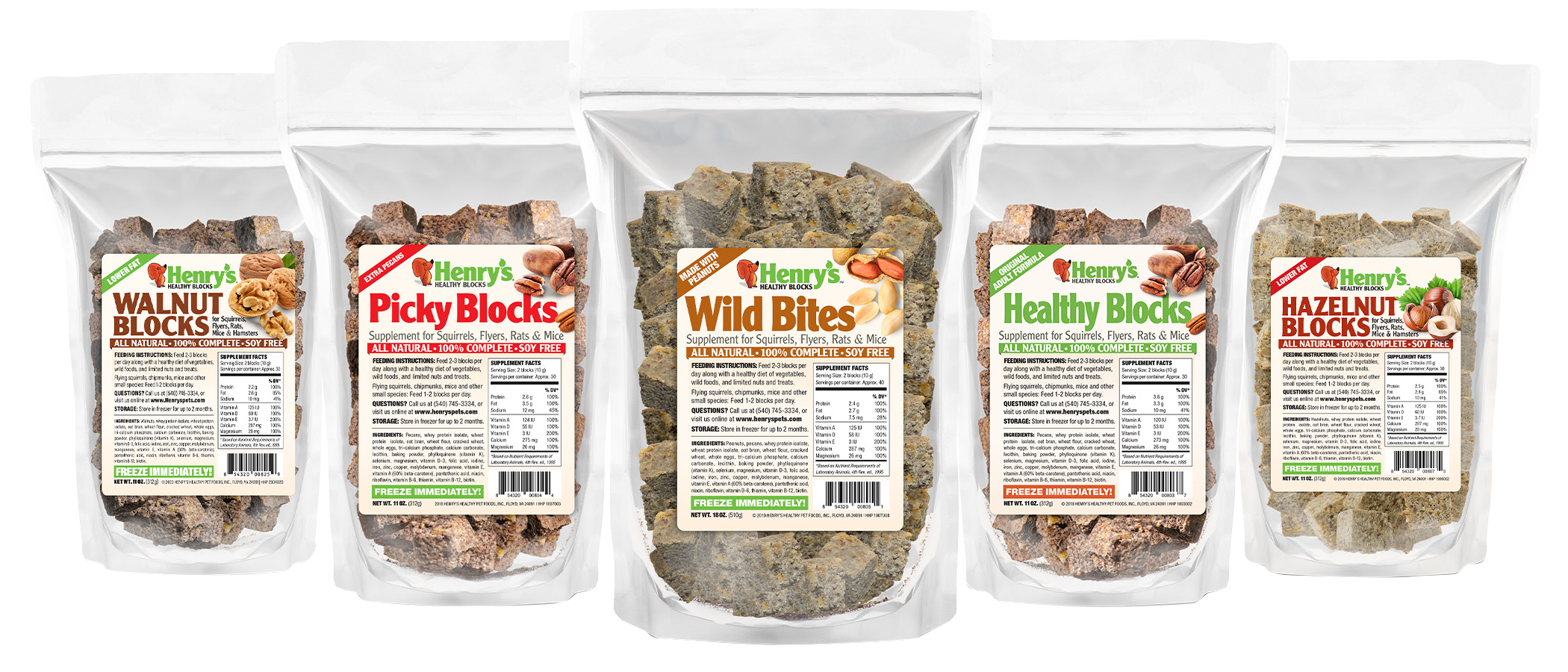Your cart (0)
Your cart is empty
Tax included and shipping calculated at checkout
Drawer menu
Tax included and shipping calculated at checkout
Squirrels need a balanced diet containing the right amounts of protein, fat, vitamins, and minerals. Since indoor squirrels don’t have access to the same food sources they have in the wild, you’ll have to provide them with a well-rounded mix of fresh vegetables, wild foods, limited treats, and supplement their diet with Henry’s Blocks.
Squirrels are omnivores and a diet based solely on nuts, seeds, and vegetables is deficient in the calcium, protein, B vitamins, vitamin D, and other essential nutrients they need. Nutrient deficient diets can cause everything from dull or patchy fur to life-threatening conditions such as Metabolic Bone Disease (MBD), which is fatal in squirrels.
A squirrel’s diet should include the following:
• Henry’s Blocks.
• A variety of healthy vegetables and wild foods.
• Limited nuts and treats.

While a well-rounded diet of vegetables and other natural foods is essential, that alone is not enough to guarantee squirrels get all the nutrients they need. Made using 100% human-grade ingredients and preservative-free, Henry’s Blocks can provide a squirrel with over 20 of the essential vitamins, minerals and the protein they need to stay healthy and happy. Unlike most commercial rodent foods that are dry, flavorless, and have a shelf-life measured in years, Henry’s Blocks are baked and shipped fresh daily using only quality ingredients and contain no artificial sweetener or fillers.
Vegetables provide fiber, fresh vitamin C, and micronutrients. Variety is key! Feed vegetables from Group 1 and Group 2 freely. Feed vegetables from Group 3 in limited amounts (they’re high in fats, starches, oxalates, etc.).
Vegetables may be fed fresh, frozen, or lightly cooked (avoid canned vegetables). Carefully wash all vegetables before feeding. Remove seeds and pits as some can be toxic and may be a choking hazard.
Group 1 (Vegetables): Arugula, bok choy, broccoli, brussels sprouts, cabbage (red or green), chayote, Chinese cabbage, cauliflower, mushrooms, purslane, watercress.
Group 2 (Lettuces): Boston, bib, chicory, endive, escarole, iceberg, loose leaf, radicchio, romaine.
Group 3 (Other): Artichokes, avocado, asparagus, carrots, celery, cilantro, cucumber, dandelion greens, fennel, corn (fresh), green beans, kale, parsley, radish, squash (all kinds), sugar snap peas, sweet potato, tomatoes.
AVOID: Bell peppers (red, green, yellow), eggplant, collard greens, okra, rhubarb, spinach, Swiss chard, turnips.

Provide extra nutrients, amusement, exercise, and help keep teeth worn down.
Before feeding any unfamiliar wild food, check to make sure it is not toxic. Gather items from areas that have not been sprayed with chemicals. Wash all wild foods thoroughly before feeding.
Safe Trees (leaves, branches, buds, etc): Apple, aspen, birch, black walnut, bottlebrush, cherry, dogwood, hickory, locust, magnolia, maple, mulberry, oak, orange, palm (never from the cycad family, which are toxic), pear, pine (3-needle and 5-needle pines), poplar, raintree, spruce, walnut.
Safe Plants: Dandelion greens, hibiscus, lambsquarters, natal plum, lawn grass, plantain, purslane, red clover, rose hips, white clover, wood sorrel.
Safe Flowers: Bottlebrush, camelia, carnations, chrysanthemum, daisies, marigold, moss rose, petunia, primrose, portulaca, roses, torenia, tulips, crocus (avoid other bulb flowers, like daffodils and lilies).
Other: Clean rocks, sea shells, antlers, or a clean box of dirt can provide something to play with, trace minerals, and help keep teeth worn down.
Toxic: Acorns (can contain aflatoxin, a deadly and undetectable poison), wild mushrooms, cardboard palm, sago palm, all members of the cycad palm family, and florist flowers (which may be dyed or treated with pesticides or other chemicals).
Note: Never use bagged potting soil or dirt from areas where raccoons or other wild animals frequent, as their feces may contain a deadly parasite. Dirt can be sterilized by baking in the over at 250 degrees for 30-60 minutes.
Treats are fun and can help with bonding, but should always be fed in small amounts after healthy foods have been eaten. Squirrels, like toddlers, can be very picky and extremely stubborn! It is important that they are not allowed to eat too many treats. If the squirrel is being stubborn and refusing healthy foods that you offer, please contact us and we will be happy to help.
Fruit (limit to 2 pieces per day): Apple, apricot, banana, blackberries, blueberries, cantaloupe, cherries, crabapples, cranberries, grapefruit, grapes, honeydew, lemon, lime, mango, nectarine, orange, papaya, peach, pear, pineapple, pomegranate, raspberries, strawberries, watermelon.

Nuts and Seeds (limit to 2-3 per week): Almonds, hazelnuts, pecans, peanuts (roasted and unsalted only), pumpkin seeds, sesame seeds, walnuts.
Insects: Mealworms, crickets. These can be bought live, dried, or canned from pet stores. Be careful with wild-caught insects as they can carry parasites.
TOXIC: Chestnuts, acorns (can contain aflatoxin, a deadly and undetectable poison), snack foods, sweets, human food, fruit pits and seeds.
• Clean out the squirrel’s food caches. They won’t eat healthy foods if they’ve got a handy stash of nuts and treats.
• Feed blocks, and no other food, in the morning when they’re hungry.
• Offer healthy vegetables and wild foods during the day.
• No treats or nuts until the squirrel has eaten their healthy foods.
Make sure the squirrel has daily out-of-cage time to run and play, a selection of branches and other things to climb and explore, and at least one active play session with you per day. This will help keep them healthy and happy.
Maintaining a Healthy Weight: Being overweight causes many health problems and can lead to diabetes, especially in older animals. Healthy weights may vary, but in general, a squirrel should look sleek and well-muscled and not have rolls of fat. If a squirrel is older, overweight, or less active, avoid foods that are high in sugars, starches, or fat.
For further assistance, including information on how to transition your squirrel to a healthy diet, please see our Picky Eaters guide, or call us at (540) 745-3334.